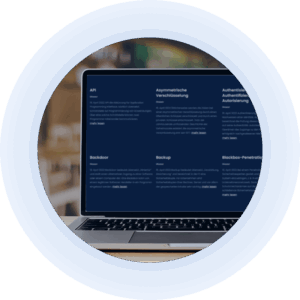
Webanwendungen sind alle Programme und Unterprogramme, die über das Internet aufgerufen und genutzt werden. Dazu gehören u. a. Internetseiten, Kontaktformulare, auf Internetseiten geschaltete Anzeigen, sich bewegende Bilder und, und, und. Wie alle Programme haben auch Webanwendungen Schwachstellen, die von Cyberkriminellen für ihre Zwecke genutzt – kompromittiert – werden können. Eine so kompromittierte Webanwendung kann einen Besucher z. B. auf eine andere Internetseite weiterleiten, ihm unter einem Vorwand Schasoftware zum Download anbieten oder seine Daten ausspähen, um z. B. sein auf der kompromittierten Website befindliches Benutzerkonto zu übernehmen.
Es gibt unterschiedliche Bezeichnungen für kompromittierte Webanwendungen. Zum Beispiel: Web Application Attackes, Angriffe auf Web-Applikationen.
Zu den häufigsten Angriffsformen zählen:
Besonders beliebt ist unter Cyberkriminellen die Nutzung von Schwachstellen weit verbreiteter Webanwendungen. Dazu zählen z. B. Content Management Systeme wie z. B. WordPress.
In Ihrem Arbeitsalltag können Sie selbst immer wieder mit kompromittierten Webanwendungen in Berührung kommen. Wenn sie z. B. auf eine interessante Anzeige klicken, diese sie zu einem Update z. B. Ihres Flash Players auffordert und Ihnen gleich einen Link dazu bereitstellt, haben Sie es wahrscheinlich mit einer kompromittierten Webanwendung zu tun. (Laden Sie Updates immer nur direkt über die Herstellerseite des jeweiligen Programms und rufen Sie diese Seite händisch auf.) Aber auch Ihre eigene Unternehmenswebsite kann kompromittiert werden. Zum Beispiel wenn Cyberkriminelle eine Schwachstelle Ihres Servers ausnutzen oder aus anderen Quellen ein oder mehrere Passwörter erhalten haben. Oder, falls Sie wie viele Unternehmen ein Content Management System wie WordPress nutzen: wenn eine Schwachstellen des betreffenden Content Management Systems ausgenutzt wird.
Wichtige Regeln für Ihre eigene Nutzung von Webanwendungen:
Wichtige Regen für Ihre Unternehmenswebsite:
Web applications are all programmes and subprogrammes that are accessed and used via the Internet. These include websites, contact forms, advertisements placed on websites, moving images, and much more. Like all programmes, web applications also have vulnerabilities that can be exploited – compromised – by cybercriminals for their own purposes. A web application that has been compromised in this way can, for example, redirect a visitor to another website, offer them malware for download under false pretences, or spy on their data in order to take over their user account on the compromised website.
There are different terms for compromised web applications. For example: web application attacks, attacks on web applications.
The most common forms of attack include:
Cybercriminals particularly like to exploit vulnerabilities in widely used web applications. These include content management systems such as WordPress.
In your everyday work, you may repeatedly come into contact with compromised web applications. For example, if you click on an interesting advertisement that prompts you to update your Flash Player and provides you with a link to do so, you are probably dealing with a compromised web application. (Always download updates directly from the manufacturer’s website for the respective programme and access this page manually.) However, your own company website can also be compromised. For example, if cybercriminals exploit a vulnerability in your server or obtain one or more passwords from other sources. Or, if you use a content management system such as WordPress, as many companies do, if a vulnerability in the content management system is exploited.
Important rules for your own use of web applications:
Important rules for your company website: